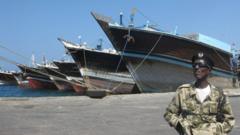Somaliland has decisively turned down a proposal from Somalia's federal government aimed at granting the United States exclusive access to the Berbera port and airbase. Berbera, situated on the Gulf of Aden's northern coast, is critical for both trade and military operations, making this development particularly noteworthy. Somaliland has maintained a self-declared independence since 1991, asserting that the ports and airbases in question do not belong to Mogadishu to negotiate away.
In a letter dated March 16 and addressed to US President Joe Biden, Somalia's President Hassan Sheikh Mohamud proposed that exclusive control over ports and airbases would bolster US security in the region, implicitly recognizing the heightened interest of foreign powers like China and Russia in the Horn of Africa. Somaliland’s Foreign Affairs Minister, Abdirahman Dahir Aden, condemned this offer as a "desperate" tactic, highlighting the growing international attention and hope for official recognition of Somaliland as a sovereign entity.
Aden expressed confidence that the US recognizes who legitimately governs Berbera and asserted, "There is nothing they can do to stop the upcoming recognition of Somaliland." The port of Berbera is operational under DP World, a notable UAE-based corporation and ally of the United States. Observers caution that Somalia's offer may encounter complications due to Somalia's own federal structure, with Puntland officials potentially opposing any unilateral decisions made by Mogadishu.
The potential of reduced US support has caused concern among Somali officials, reminiscent of actions taken during Trump's first term. The region remains crucial for the US as it aids in counter-terrorism efforts against al-Shabab, an affiliate of al-Qaeda. The attempt to negotiate control of these facilities underscores the geopolitical complexities surrounding Somaliland, Somalia, and foreign interests in the region.
Previously, disputes over Somaliland's ports have sparked tensions, recently highlighted by Ethiopia's maritime agreement with Somaliland, which Mogadishu condemned as an infringement upon its territorial integrity. As such negotiations continue, the future of these strategic assets remains highly contested, affecting both local governance and international relations.



















